Ceremony honors the gift that “speaks a thousand words”
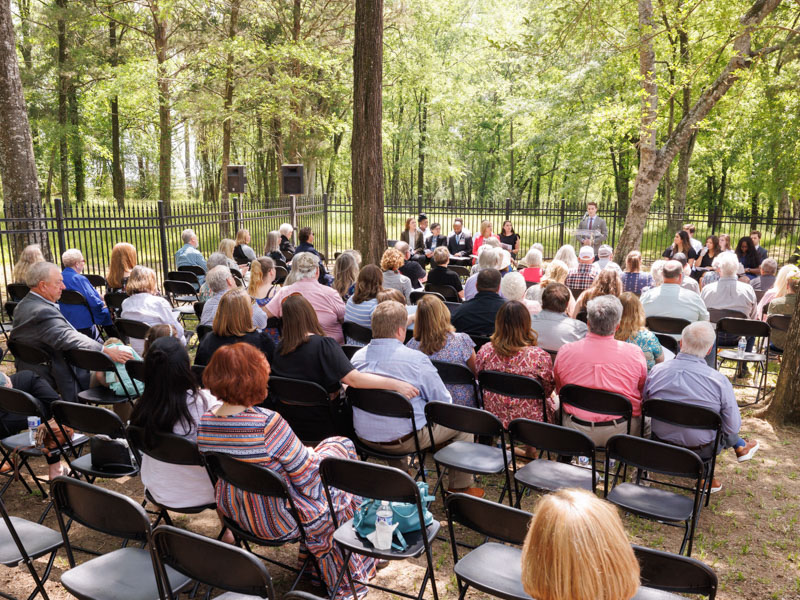
Her name was Pearlie Crawford. In her home, she started a day care for children of doctors and nurses in Meridian. One of her children died of leukemia at age 24.
Grateful for the care her son received at the University of Mississippi Medical Center, Pearlie Crawford decided to “teach” students at UMMC: She donated her body to medical science.
On Wednesday, in the UMMC Cemetery, Pearlie Crawford’s name, along with more than 100 others, was read aloud during A Ceremony of Thanksgiving in Memory of Anatomical Donors.
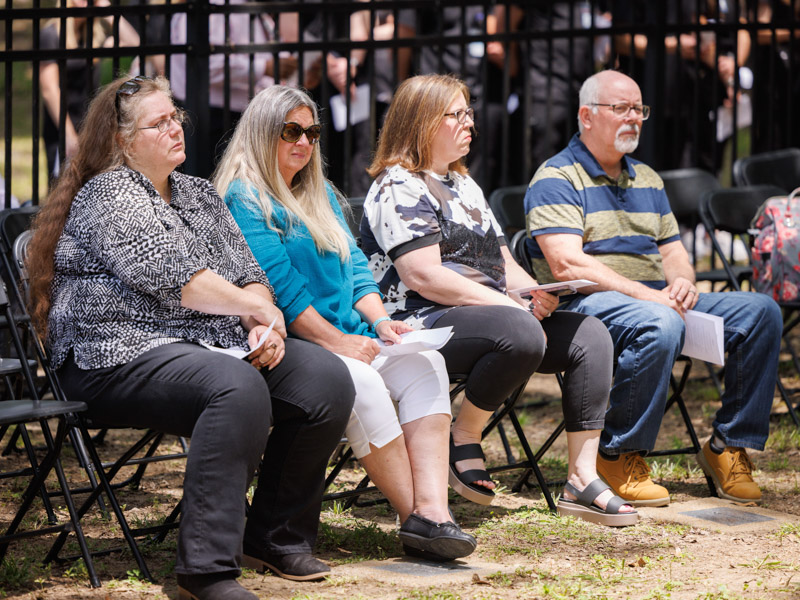
“To us, it is the roll call of heroes,” said Dr. Norma Ojeda, professor and chair of advanced biomedical education at UMMC. “Those who saw beyond their own mortality to enrich the life of future generations.”
The occasion was an opportunity to put names with those who otherwise remain anonymous as students learn from them the lessons of human anatomy.
“Whatever their occupation might have been … you can add to that anatomical donor, first patient, teacher,” said Dr. LouAnn Woodward, vice chancellor for health affairs and dean of the School of Medicine at UMMC.
“I can tell you from my own personal experience, having been a student here, you never forget that first patient.”
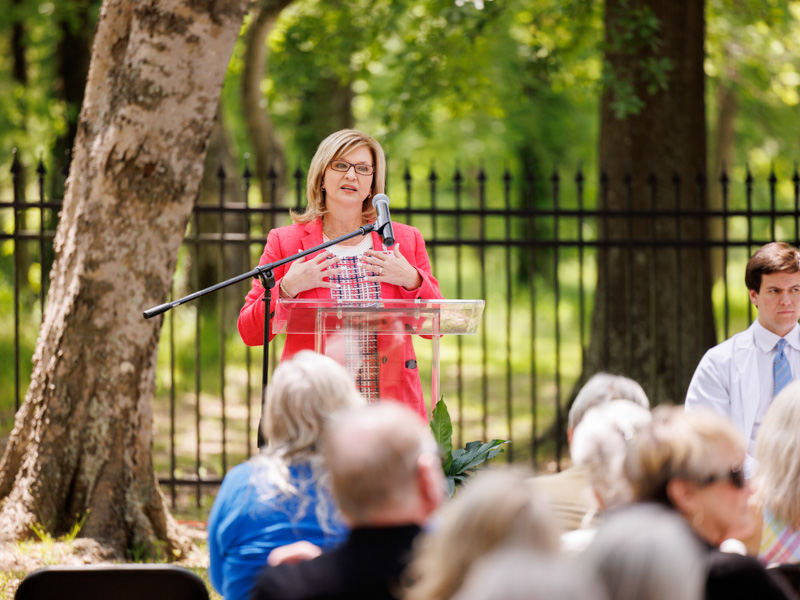
Because many students do consider donors their first patients, several from UMMC’s health professions schools were also on hand to pay tribute to them.
Six students from four different schools described the impact these benefactors had made on their lives:
- “Because of your family member’s selfless donation, we were able to learn more about the intricacy of the human body, far more than any lecture could teach us. … Their donation is one that will have lasting impact on us as individuals, our future patients and the future health care of Mississippi.” – Anna Minga, first-year, occupational therapy, School of Health Related Professions
- “Just as they each left a legacy in the lives of their family, friends and community, they have also left a lasting legacy in our lives, a group of people who they never met. Their collective generosity and altruism will live on for years as each of us comes to seek and serve our communities with the knowledge they have helped to give us in our respective fields.” – Walker Hardin, first year, physical therapy, SHRP
- “When I first saw my donor, I saw someone’s father, grandfather, uncle and friend. I wondered what he did for a living, what part of the state he was from, what were his hobbies and who was missing him. … In these past few months, I have studied how amazing the human body is. From the complex highway of nerves and blood vessels to the strategic placement of muscles, I have learned so much about God’s perfect creation.” – Karleigh Williamson, first-year, School of Dentistry
- “When you speak to a physician or patient about their experience in a hospital, they don’t speak about the science; they talk about the people they met, the conversations they had, and the relationships they built. And that is the magic of medicine. … In our very first class, your loved ones teach us an important lesson in sacrifice and selflessness and an invaluable truth about humanity – that people are good. And that people wish to do good.” – Madison Klim, first-year, School of Medicine
- [Addressing the donors] “You teach us to be better humans by reaching a part of us that no textbook or lecture can – our hearts. … [Y]ou are the greatest contributors to this education journey, all without ever saying a word. Your action of gifting yourself has spoken a thousand words and continues to speak, even beyond the walls of the anatomy laboratory, beyond the first year of so many students’ education, beyond our careers, and beyond each and every soul we will care for.” – Oheneba Boadum, third-year, clinical anatomy, School of Graduate Studies in the Health Sciences
- “During lab orientation, the final thing we were reminded of was that these donors are people, …. people who had decided to allow us to use their bodies to further our understanding of human anatomy. People who didn’t wear capes, but were indeed heroes.” – Tija Johnson, first-year, biomedical sciences, SGSHS
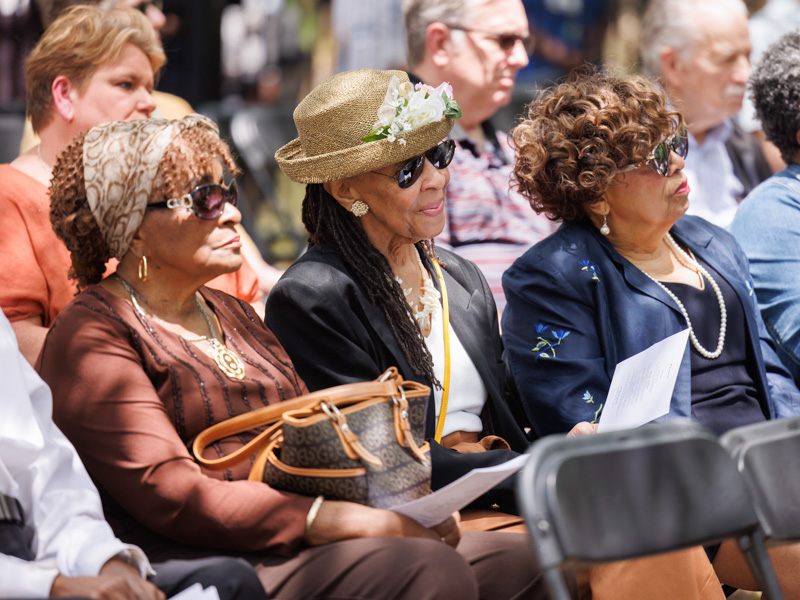
Six more students read the roll call; among them was Kayla Pavlick, a third-year clinical anatomy student in the SGSHS. At the end of her list, she said, “and lastly, my grandfather, Albert Steven Pavlick Sr.”
Albert Pavlick of Quinlan, Texas, was a carpenter and mechanic who helped install windows in New York’s World Trade Center, Kayla Pavlick said afterward. He died last summer at age 76.
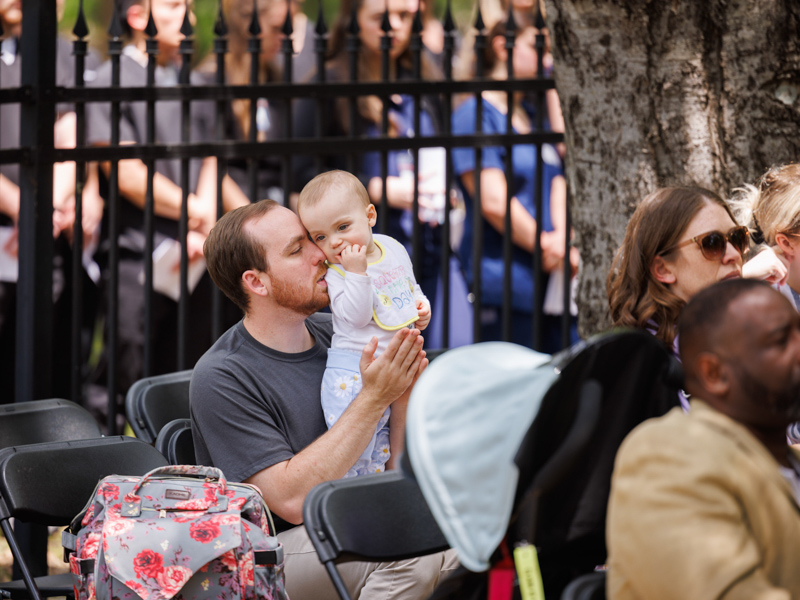
“He was very proud of me,” Pavlick said. “Toward the end, he started asking me more questions about what I did and what impact it would have. Based on that, he made the decision to donate his body.”
Although Albert Pavlick is a body donor in another program, having his granddaughter read his name aloud afforded the proceedings an astonishing moment of profound relevance, as Ojeda knew it would.
“This speaks to people how important body donation is,” Ojeda said following the ceremony. It brought home the power of this gesture – body donation – and what it means to someone who is not only a student, but also a loved one.
Body donation was certainly personal for Pearlie Crawford, said Susan Enns, one of her daughters, who drove from her home in Bagdad, Florida. “After my brother died, my mom said, ‘The University treated him so well, with such dignity; so, this is my gift for what they did for him.’ That’s why she donated her body.”
Pearlie Crawford’s name was near the top of the roll call. As was the name of William Clopton who died in January of last year at age 81. He donated his body to honor a family tradition, said his wife, Wilma E. Clopton of Jackson.
“We both decided to do this,” she said.
William Clopton was an Air Force command pilot who had been trained by the Tuskegee Airmen and had a degree in chemistry, Wilma Clopton said. “He was also the most loving husband you could possibly meet. And I think he would have been pleased at this very thoughtful ceremony.”
Before the reading of the names, Mark Gilbert, lead hospital chaplain at UMMC, explained why anyone could give thanks “at a time like this” – after the death of a loved one.
“We give thanks because we have memory,” he said. “Today we bring to mind in the spotlight of our attention each name that is being called today. We bring to mind in the spotlight of our attention each person’s life as a whole.
“We bring to mind in the spotlight of our attention simple, yet important questions. What was their job? What was their favorite thing to do? What did they like? What did they dislike? What role did they have and play in your family?
“With these questions, we bring to mind in the spotlight of our attention their humanity, their personhood, their giving spirit. We give thanks today.”
To find out more about the Body Donation Program at UMMC, go here.


